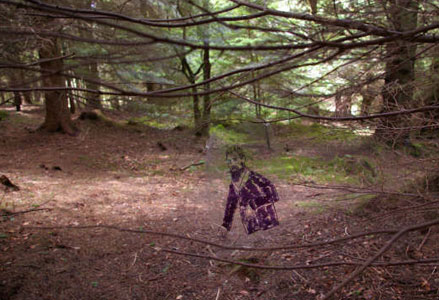
In 1947 Llanrwst Town Council applied for a seat on the United Nations Security Council on the basis of its special status as an independent town state poised strategically between England and Wales. As someone intrigued by the phenomenon of micronations and the drivers that might inspire a person or group to declare their home a micronation, I have always admired the Llanrwstian pluck, going all the way to the UN with their case.
A couple of years ago, arts agency Safle invited applications for an artists project in Llanrwst inspired by this rich story of attempted micronationhood: “The title refers to the period of independent history of the area and famous historical characters such as Owain Glyndwr, Rhys Gethin and Hywel Coetmor, at which period the town was a rebel stronghold, was burnt to the ground by the Prince of England’s forces and was deserted except for a herd of deer grazing in the square.” In November 2008, windows across the town square were filled with light-based artworks as part of the culmination of this project, which recognised Llanwrst’s aspirations towards microstate status.
This elegant art project is only one chapter in a series of artistic tributes to Llanrwst’s struggle. 80s Welsh punk rock group Y Cyrff wrote “Cymru Lloegr a Llanrwst”, a song commemorating these aspirations, which has become a Welsh anthem of a sort:
I discovered long ago that my interest in micronations was far from isolated. When I was in Helsinki on a curatorial residency at NIFCA some years ago, I picked up the catalogue for a meeting of kings, presidents and representatives of “self made” countries that occurred in Helsinki in 2003, as part of a micronation summit at MUU Gallery. Susan Kelly’s talk was very insightful, revealing that if “democracy is about ‘shape shifting’, and not about being able to count up the heads within a particular pre-given ‘shape’ or constituency, there is a need to imagine and experiment with other practices and modes of belonging. Perhaps we could say that the micro-states de-familiarise the masking Russian doll and provide tools to imagine, recognise, make understandable or legible this complex ‘here-ness'”.
There’s something wild and speculative and wonderful about the idea of removing oneself from the constraints of the various spatial identities we find ourselves defined by (and you don’t even necessarily need to be in the crossfire of two cultures at odds, like the English and Welsh borders clashing near Llanrwst). The idea is so appealing that Wired recently released a cheat sheet on how to start your own country. Perhaps the most revealing bit of the surprisingly banal article was revealed in a quote from Carne Ross, the fact that the process of developing nationhood is “profoundly political.” To anyone who has started any new venture with a degree of visibility, this notion of “buy-in” and how profoundly political it is comes as no surprise. The desire to take the boundaries of a new venture and escalate the ambition to that of a genuinely recognised state, is more surprising, fascinating, and in some cases, understandable.